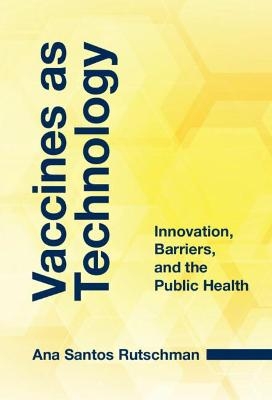
Vaccines as Technology
Innovation, Barriers, and the Public Health
Seiten
2022
Cambridge University Press (Verlag)
978-1-009-12576-5 (ISBN)
Cambridge University Press (Verlag)
978-1-009-12576-5 (ISBN)
Since the pandemic, we have all become more aware of the mechanisms of vaccine development and distribution, and interested in how it could be improved. This book explains the legal and policy issues for a non-specialist readership, covering key problems in vaccine regulation, patents, technology transfer, and international relations.
The COVID-19 pandemic served as a powerful wake-up call, highlighting our collective need for the effective development and equitable distribution of new vaccines, in addition to widespread administration of existing ones. The current models of production and allocation of vaccines against emerging pathogens, which rely on predominantly market-driven mechanisms, are largely at odds with public health needs. This book is the first to explore the entire arc of vaccine development and distribution, from the decisions about allocation of vaccine R&D money to allocation and administration of vaccines resulting from the R&D process. It explains key concepts and problems in vaccine regulation, intellectual property, technology transfer, and international relations, making complex material accessible to a non-specialist audience. Analyzing the impact of COVID-19, the book also covers several other vaccine races, as well as future directions in vaccine development and allocation.
The COVID-19 pandemic served as a powerful wake-up call, highlighting our collective need for the effective development and equitable distribution of new vaccines, in addition to widespread administration of existing ones. The current models of production and allocation of vaccines against emerging pathogens, which rely on predominantly market-driven mechanisms, are largely at odds with public health needs. This book is the first to explore the entire arc of vaccine development and distribution, from the decisions about allocation of vaccine R&D money to allocation and administration of vaccines resulting from the R&D process. It explains key concepts and problems in vaccine regulation, intellectual property, technology transfer, and international relations, making complex material accessible to a non-specialist audience. Analyzing the impact of COVID-19, the book also covers several other vaccine races, as well as future directions in vaccine development and allocation.
Ana Santos Rutschman is outgoing Assistant Professor of law Saint Louis University and incoming Professor of Law at Villanova University. She was named a Health Law Scholar (2018) and a Bio Intellectual Property Scholar (2017) by the American Society of Law, Medicine & Ethics for her work on vaccine law and policy.
Introduction; 1. Vaccines as instruments of public health; 2. The vaccine development ecosystem; 3. Vaccine development under proprietary paradigms; 4. Access to vaccine technology; 5. Aligning vaccine innovation with public health needs; 6. Vaccines of the future: present and emerging challenges; Conclusion: broader implications for global public health.
| Erscheinungsdatum | 05.04.2022 |
|---|---|
| Zusatzinfo | Worked examples or Exercises |
| Verlagsort | Cambridge |
| Sprache | englisch |
| Maße | 151 x 229 mm |
| Gewicht | 300 g |
| Themenwelt | Studium ► Querschnittsbereiche ► Prävention / Gesundheitsförderung |
| Recht / Steuern ► EU / Internationales Recht | |
| Recht / Steuern ► Privatrecht / Bürgerliches Recht ► Medizinrecht | |
| Sozialwissenschaften ► Soziologie | |
| ISBN-10 | 1-009-12576-1 / 1009125761 |
| ISBN-13 | 978-1-009-12576-5 / 9781009125765 |
| Zustand | Neuware |
| Informationen gemäß Produktsicherheitsverordnung (GPSR) | |
| Haben Sie eine Frage zum Produkt? |
Mehr entdecken
aus dem Bereich
aus dem Bereich
das Manual zur psychologischen Gesundheitsförderung
Buch | Hardcover (2023)
Springer Berlin (Verlag)
CHF 55,95
Wissenschaftlich basierte Empfehlungen, Tipps und Ernährungspläne für …
Buch (2022)
Thieme (Verlag)
CHF 69,95


